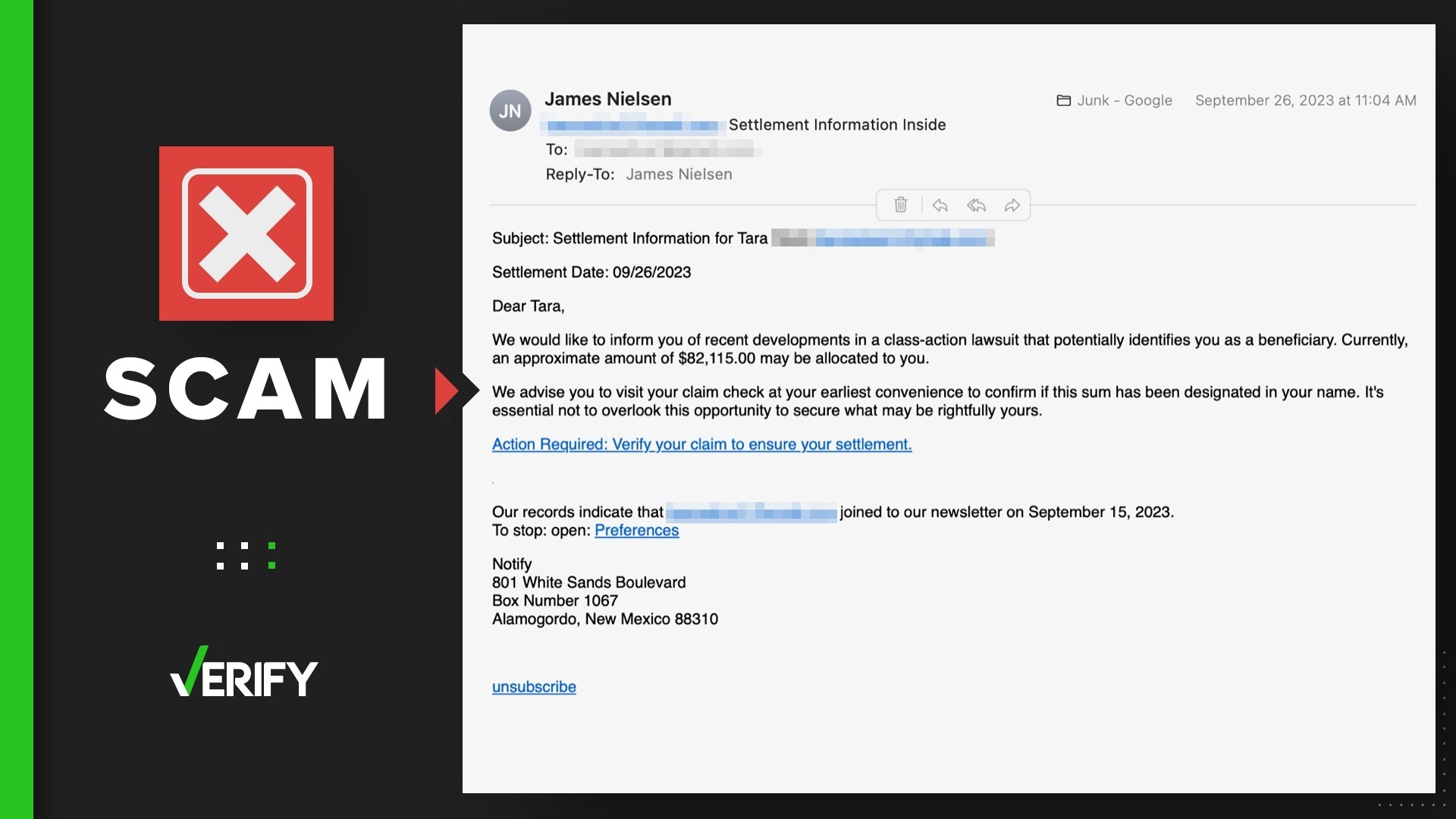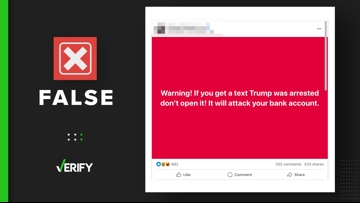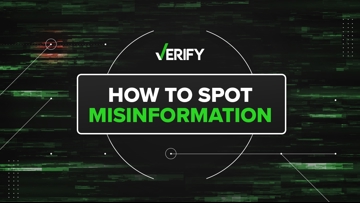When class action lawsuits are settled, claimants often get emailed notices about money they’re eligible to receive.
But sometimes it’s difficult to know whether these emails are real or scams. VERIFY reader Tara asked us how you can spot a settlement scam with an example of an email she recently received.
THE QUESTION
Do scammers send emails that falsely offer money from class action settlements?
THE SOURCES
- Federal Trade Commission (FTC)
- Consumer Financial Protection Bureau
- Better Business Bureau (BBB)
- AARP
- Melanie McGovern, spokesperson for the BBB
- VERIFY analysis of search results related to information in the email
THE ANSWER
Yes, scammers send emails that falsely offer money from class action settlements.
WHAT WE FOUND
There’s a history of scammers taking advantage of class action settlements to trick people into giving away their information or money.
“When large numbers of consumers get settlement money, scammers sometimes pop up,” the Consumer Financial Protection Bureau said in a 2018 class-action settlement notice.
In 2019, the Federal Trade Commission (FTC) warned that people were putting up fake websites meant to look like the official website for an Equifax settlement. Around the same time, KnowBe4, a cybersecurity company, issued a warning about a phishing email that looked like an Equifax email regarding the settlement.
The Better Business Bureau (BBB) also warned in 2023 that scammers were emailing and calling people with claims that the victims may qualify for compensation for the Camp Lejeune class action lawsuit. The scammers said the victims may be entitled to tens of thousands or even millions of dollars. The scammers prompted their victims to click links that could download malware to their devices or collect their personal information, or asked the victims to pay an upfront filing fee to get their money.
Scams posing as emailed class action settlement notices often come with red flags that you can use to identify the email as suspicious or malicious. We’ve VERIFIED five such red flags, using reader Tara’s email as an example.

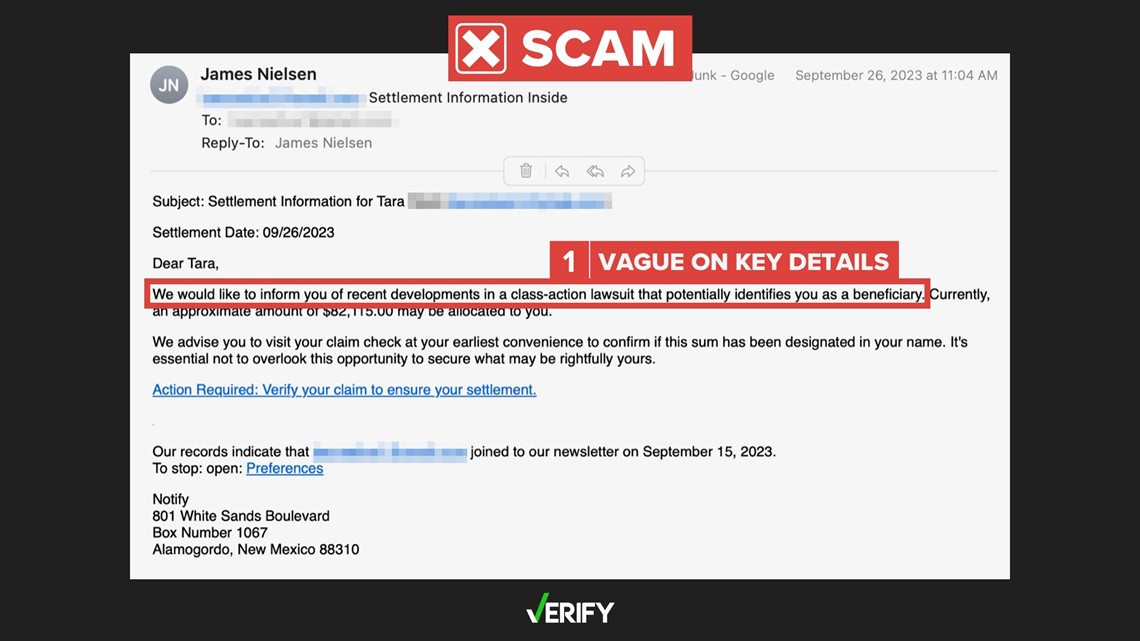
Red flag #1: The email is vague on key details about the settled class action lawsuit
A real class action notice will give you details about the settled lawsuit. It will tell you who was sued and why they were sued, and it will likely tell you why or how you’ve been identified as a potential claimant.
You should also be able to understand who is emailing you when you read the class action notice. Typically, these notices are sent by lawyers involved in the suit, the sued company or a third-party administrator who oversees the settlement and distribution of claims.
“The email doesn’t give a company name, or any further information which is a red flag for sure,” Melanie McGovern, a spokesperson for the BBB, said of the email Tara received.
“[A class action email notice should] give you all of the details about the class-action lawsuit: when it was filed, where it was filed, if you are a member of the class, what you can do, how you can opt in, how you can opt out, and your options if you do nothing,” McGovern added. “There are a lot of details in any notification about a class-action lawsuit.”
The AARP recommends you check the supposed lawsuit’s authenticity by searching online for the name of the company and “lawsuit.” You could also search for the company’s name and “class action” or “settlement.” If you don’t get any results identifying recent legal actions against the company, then the email probably isn’t legitimate.
McGovern recommends that you also try to find court documents to confirm the authenticity of the settlement.
“If you do find the claim online through the court documents, usually there is a link to a website that will ask you a few questions to see if you are actually part of that class,” McGovern said. “So if you're going through that route, you can always give the organization a call that sent you the email to make sure that it is legitimate.”
So if the email doesn’t even give you enough information to check the lawsuit’s authenticity, it’s probably not coming from a trustworthy sender.

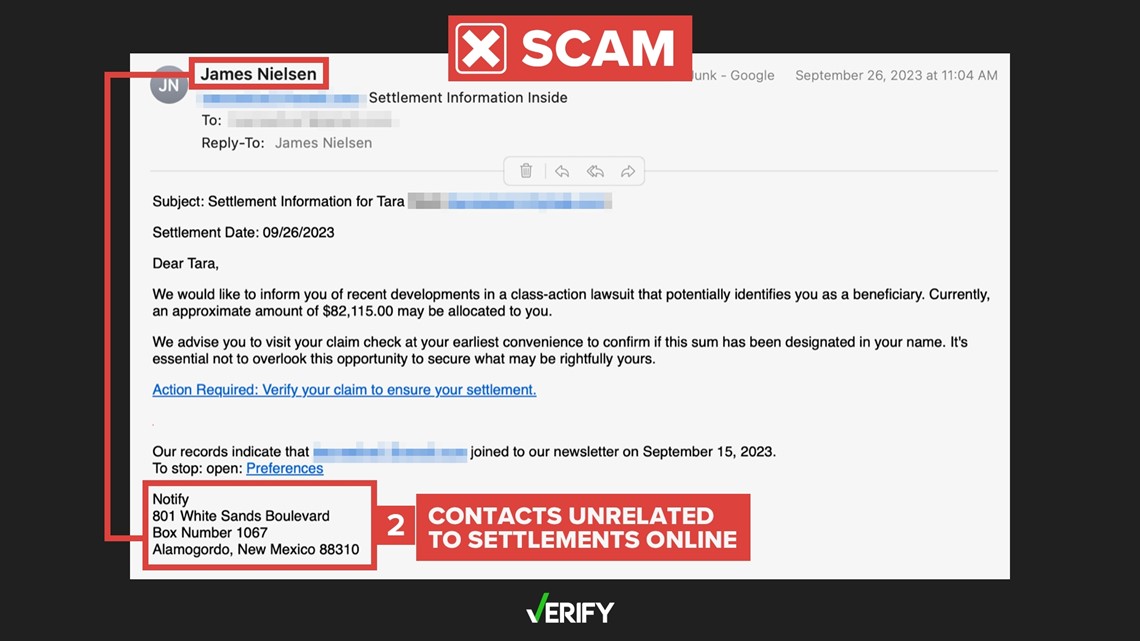
Red flag #2: You can’t find anything online when searching the email’s contact information
You should also search for information like names or addresses included in the email.
Google search results for the name in Tara’s email, James Nielsen, plus “settlement” or “class action,” fail to include anything about a recent class action lawsuit.
The top result is a Reddit thread that asks if this exact email is a scam. Another top result is a page for a California-based lawyer without a history of class action cases named James Nielsen. Nielsen confirmed in an email to VERIFY that the email didn’t come from him.
Another search result is a Nielsen Securities Settlement with a different contact address than the one that’s included in the email. The contact address in Tara’s email is actually the address of a New Mexico Staples store with a mail service that allows people to use anonymous in-store mailboxes as their own.


Red flag #3: Unusually large payout
Class action lawsuits usually involve a lot of people. That means people are more likely to get only a few dollars – not thousands – from an authentic settlement, AARP says.
“If you're part of a class action, you're getting a very small amount or you're getting free credit monitoring or things like that,” McGovern said.

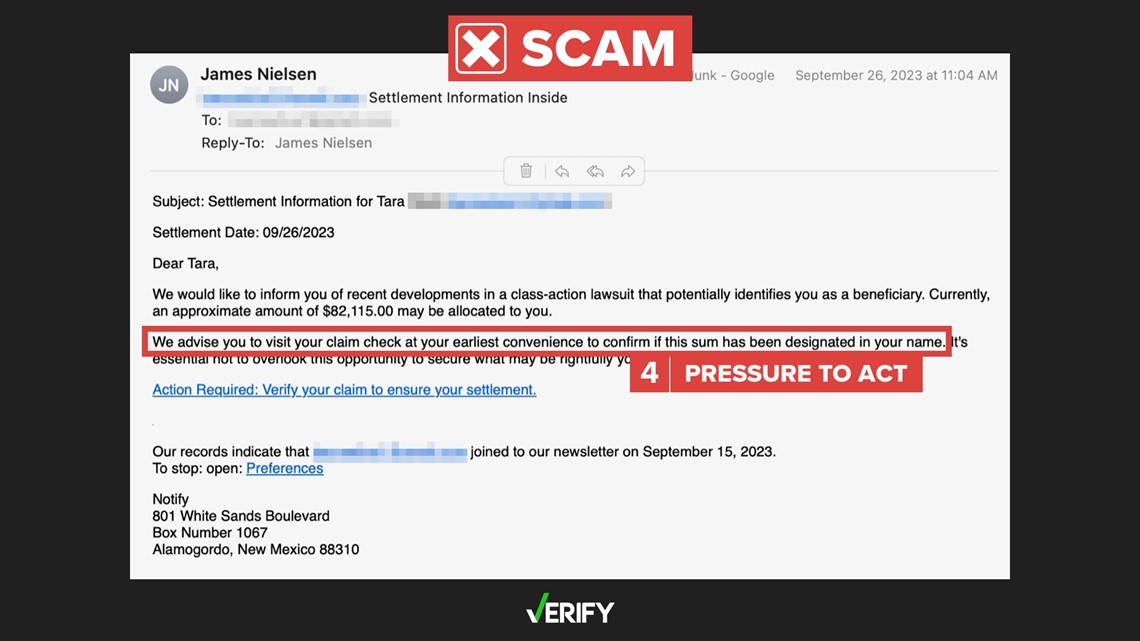
Red flag #4: Pressures you into acting
Scammers often try to pressure victims into quickly taking action with urgent language.
“Scare tactics and emails that produce a sense of urgency are quite common in phishing scams, as are promises of rewards that sound too good to be true,” the BBB says in an article on how to spot a phishing email.
When scammers send fake class-action notices, they often want to convince you that your settlement will be forfeited if you don’t act or respond immediately, the AARP says.
Typically, if you are an eligible claimant for a settlement, you have the choice to file a claim, deny your claim or ignore it entirely. If you want to file a claim, you’ll do so through a form on a settlement website.
“Even if you don't act, you are still part of a class,” McGovern said. “Sometimes they have you opt in, sometimes they have you opt out.”
But the notice in the email sent to Tara does not give the reader the option to opt in or to opt out. Instead, it tells Tara to confirm the claim and that “it’s essential not to overlook this opportunity to secure what may be rightfully yours.”

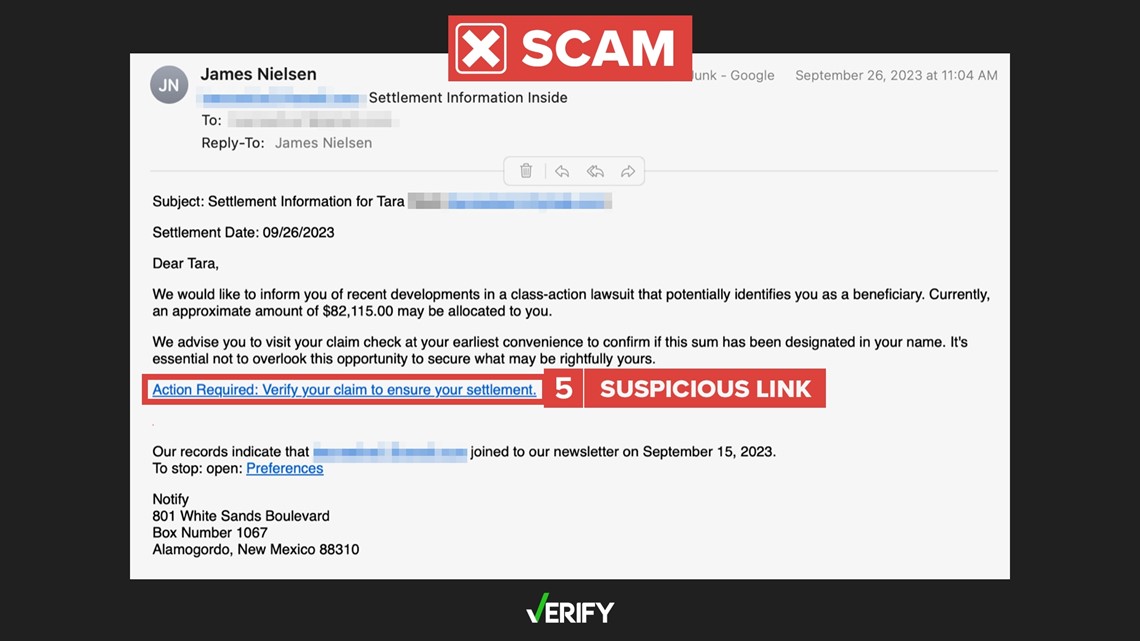
Red flag #5: Suspicious links
“Phishing emails and text messages often tell a story to trick you into clicking on a link or opening an attachment,” the FTC says. The hyperlink may take you to a website designed to trick you into parting with personal or financial information, or it might install malware onto your computer to simply steal that information.
When you hover over a hyperlink in an email, the URL should appear either at the bottom left of your screen or should appear just above the link. Shortened emails, like bit.ly links, can be used to obscure sketchy URLs, the BBB says.
And even if you do end up clicking on the link, whether by accident or on purpose, you should scrutinize the website before going any further.
“If the website doesn't look quite right, if there's broken English, if it looks like it was put together quickly, if it looks like photos might have been stolen from another website, again, the best thing to do is try to figure out what that case number is, and look it up online to see if this is actually a class and you are actually eligible,” McGovern says.
You should avoid clicking on links in unsolicited emails from unfamiliar senders.
